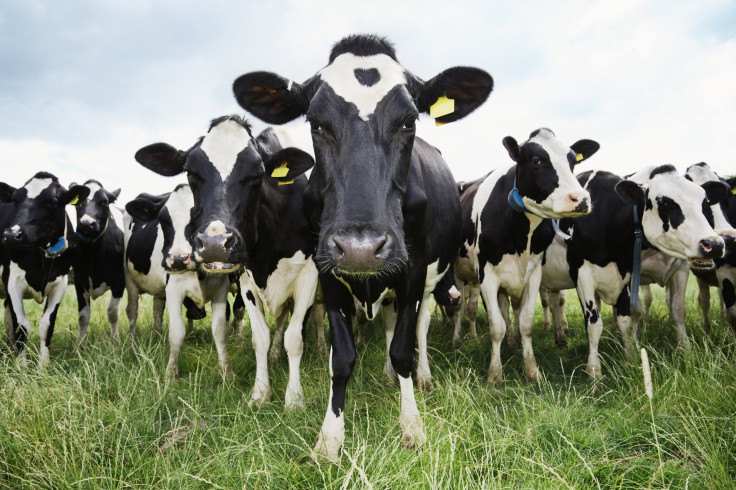Cow Farts Have Larger Greenhouse Gas Effect Than CO2? California To Regulate Methane To Fight Global Warming

Anyone who has ever been near a dairy knows that cows can be smelly beasts: they fart and poop constantly, filling the air for miles with the acrid scent of their bowels. For anyone who may find that aroma repulsive, California is on the case.
California Gov. Jerry Brown this week signed into law a bill that would place limitations on emissions of greenhouse gasses like methane and black carbon. Those types of gasses, known collectively as super pollutants, have some of the biggest impacts on global warming but remain in the atmosphere for a much shorter period of time than carbon-dioxide (CO2).
The new California law requires the state to approve and begin implementing a strategy to cut super pollutant emissions from dairy, livestock, organic waste and landfills. They must reach a goal that includes a cut of methane emissions by 40 percent, hydrofluorocarbon gases by 40 percent and anthropogenic black carbon by 50 percent below 2013 levels by 2020.
Cow farts, for their part, are rich in methane.
“Cutting black carbon and other super pollutants is the critical next step in our program to combat climate change,” Brown said Monday in a statement after signing the law. “This bill curbs these dangerous pollutants and thereby protects public health and slows climate change.”
Hydrofluorocarbons (HFCs) are used in refrigeration and air conditioning and began being used to replace ozone destroying chlorofluorocarbons. Black carbon is created when fossil fuels aren’t burnt completely — it's basically soot. Methane comes from a variety of organic sources, including living animals and landfills.
The three gasses have varying levels of potency and lifespans. Methane is roughly 30 times better at trapping heat than CO2 and stays in the atmosphere for an average of roughly 20 years. HFCs are 3,830 times more potent than CO2 and have a 14 year lifetime. Black carbon stays in the atmosphere for just weeks and is very potent, though it has a variable potency.
Removing just one ton of diesel black carbon from the atmosphere, Brown’s office said, is equivalent to taking out 1,000 to 2,000 tons of CO2.
“The policies that California is implementing, if achieved worldwide, would cut the expected rate of global warming in half by 2050, save millions of lives, avoid millions of tons of crop losses per year and slow dangerous climate feedbacks such as melting ice caps and rising sea levels," Dr. Veerabhadran Ramanathan, a distinguished professor at the San Diego Scripps Institution of Oceanography, said in a statement accompanying Browns’ comments.
The potential to eliminating greenhouse gasses is an obvious goal for California. The state, which is in its fifth year of a blistering drought, is already being impacted by the effects from a warming climate which exacerbates conditions that may extend that drought, new research this week showed. If those effects aren’t mitigated, the state could potentially be looking at prolonged drought for decades or centuries to come, that report suggested.
© Copyright IBTimes 2025. All rights reserved.






















